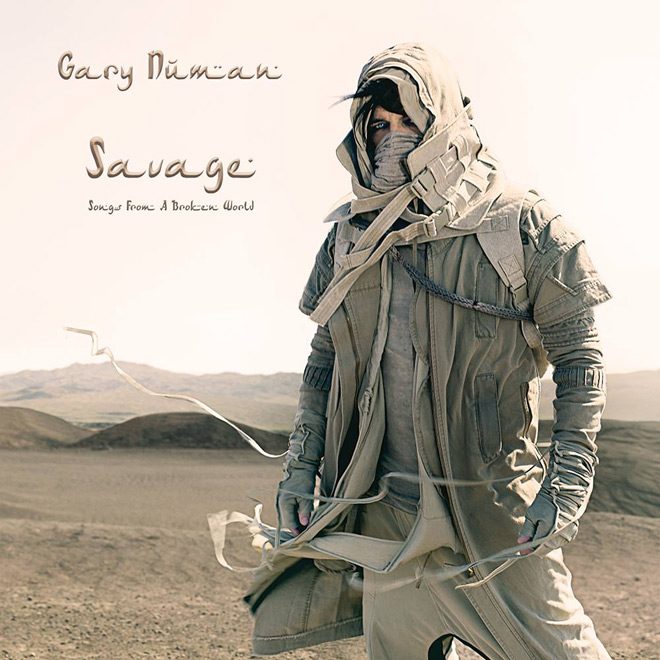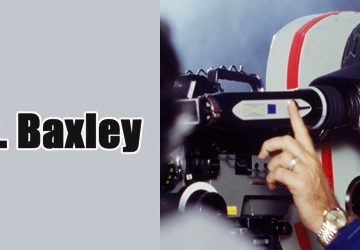
Born in March 1958, in Hammersmith, London, England, Gary Numan started his music career as the frontman of the New Wave band Tubeway Army, with which he released two full-lengths, 1979’s self-titled album and the following year’s Replicas, whose sound documented Numan’s musical transition from the abrasiveness of Post-Punk to the electronic predisposition and melodic gloss of New Wave/Synthpop. The success of especially the band’s second album, which spawned the now classic single “Are ‘Friends’ Electric?,” deemed it to be also the last. For, only half a year after its release, Numan immediately emerged as a solo artist, with the strength of his first lone endeavor, that same year’s The Pleasure Principle, which many regard as a New Wave hallmark album, containing Numan’s and the genre’s most recognizable song, “Cars.”
However, Numan did not rest on the hood of his most successful song. He soldiered on through the illustrious 1980s, which saw the prolific Numan releasing eight albums, from 1980’s Telekon to 1988’s Metal Rhythm, in which his foray into a more Industrial sound has been fully realized; and into the decades that followed—four albums for the ’90s, two for the 2000s, and three for the 2010s, including the newly released Savage…, his overall twenty-first oeuvre.
Unleashed on September 15, 2017, via BMG, Savage (Songs from a Broken World) is a sequel to 2013’s Splinter (Songs from a Broken Mind), with which it shares similar thematic scope and musicality. Its Industrial elements are well aligned with the similar excursions of the likes of Ministry (Psalm 69: The Way to Succeed and the Way to Suck Eggs), Skinny Puppy (Mind: The Perpetual Intercourse), and Nine Inch Nails (The Downward Spiral), all of which cite Numan as one of their musical influences.
It opens with the sparse, Middle Eastern–flavored Industrial punch of “Ghost Nation.” The ambience turns even deeper into the desert-dry regions of the subcontinent, as the World-inspired “Bed of Thorns” comes at play. Spiraling next and then crawling ominously afterwards is the dizzying crunch and hypnotic, Arabic mode of “My Name Is Ruin.” Slower, darker, and blood-curdling, “The End of Things” has truly captured Numan’s vision of an apocalyptic future; but whose celesta Pop melody balances the song’s gloom. It will fit on a playlist that includes similarly Gothic-inspired Synthpop songs like “Black Celebration” by Depeche Mode, “The Great Commandment” by Camouflage, and “Ravishing Delight” by Trisomie 21.
The pseudo-romantic “And It All Began with You” and the Synth-Grunge hybrid “When the World Comes Apart” are further treks down the barren land of guilt, destruction, blame, and sonic sparseness. At this stage, the initiated may be reminded of similar morbid excursions and aural angst of bands like HIM (“Join Me in Death”), My Chemical Romance (“Welcome to the Black Parade”), and 30 Seconds to Mars (“From Yesterday”).
Then there is the floating, spacey soundtrack sound of “Mercy,” whose rhythm and pattern seamlessly bleeds into the ensuing “What God Intended.” Nearing the end of the hero’s journey, the emphatically percussive yet synth-driven “If I Said” envelops the listener with its swelling and undulating rhythm. Finally, Numan closes his filmic opus with the disturbing, chopping attack of “Pray for the Pain You Serve.” The credit rolls: With Numan at the helm as songwriter, vocalist, and keyboardist are longtime collaborator/composer Ade Fenton on keyboards and programming; Steve Harris on guitars; Tim Slade on bass; and Gary’s daughter Persia, who provided the eerie female voices.
Savage (Songs from a Broken World) is a total package—conceptually cohesive from title and cover design to lyrical themes and musicality itself. It will pass as a soundtrack to a fictional dystopian Science Fiction Action-Thriller film in the epic caliber of Mad Max (1979), Dune (1984), and In Time (2011). After all, Numan himself describes his latest offering as “set in a post–global warming, apocalyptic Earth in the not-too-distant future,” in which “the planet [has become] a desolate, desert wasteland.” Such an imagery for a meticulously conceived and well-produced album. CrypticRock gives Numan’s new masterpiece a well-deserved 5 out of 5 stars.
Purchase Savage (Songs from a Broken World):
[amazon_link asins=’B073XSLZXM,B074Q2GZ39′ template=’ProductCarousel’ store=’crypticrock-20′ marketplace=’US’ link_id=’59f12764-9ecd-11e7-8da7-9d228adb6604′]







I LOVED, LOVED, LOVED this latest from Mr. Numan! His take on the post-apocalyptic is fraught with so many dystopian landscapes; fear, the profound nature of who we are and where we, as a world, are heading, and self-loathing and self-doubt of a world out of control. Gary’s “character” in this world is a reluctant hero, making his way the best he can, through the desert that our home has become.
The themes of each song, backed by heavy Middle Eastern musical influences, give credibility to a sand-covered wasteland where East and West are forced together for survival. Numan has been credited by luminaries such as Trent Reznor and Stabbing Westward’s Christopher Hall as pioneering the synth-industrial landscape that they made more famous (unfortunately) than Numan did, originally. Gary has never stopped creating, however, and this, latest foray and sequel to “Splinter (Songs from a Broken Mind)” is as enjoyable, if not more so, than its sequel. The world created by Numan in this work is gloomy and palpable, and each song works to shore up the feeling that we can almost feel the sand on our tongues and the dryness of our skin.
“Ghost Nation,” sets the stage for this voyage of despair in living in a post-climate change future: “We live in a windswept hell/Where dust and death are neighbors.” Ghostly voices are heard in the background, hinting at the desert-dwelling denizens of this parched landscape. Numan has a wonderful facility with melody, particularly with choruses, which is evident in this song; industrial music is encapsulated in the chorus, here.
“Bed of Thorns” explores self-doubt and judgment as he welcomes someone else to “live my life” and “sleep on my bed of thorns.” The Middle East is harkened, again, this time with a female presence, juxtaposing a mechanical backbeat and reed-like, floating pipes and strings. More than any other song on the album, Numan calls to mind the previous album, “Splinter: Songs from a Broken Mind.” It reminds me of the song “I Am Dust,” insofar as the structure of the song is similar, both melodically and lyrically. It’s not derivative, however, but just as brilliant.
“My Name Is Ruin” is a straight-up industrial gem; again incorporating Eastern pentatonic schemes and heavy synth downbeats. The song delves into feelings of guilt, spite, anguish and, again, judgment, hypnotically framed by lyrics that are pronoun-heavy; “me,” “they” and “you” forming a triangle of abuse and blistering vengeance.
“The End of Things” opens with enveloping strings and celeste-like synths, which continue throughout, mixed with heavy, melodic elements. The song addresses the hopelessness and powerlessness one has in the face of overwhelming odds. It is a song that makes use of peculiar oxymoronic lyrical references “I see a darker shade of darkness/I hear a shadow hide in the lie,” yet is quite dark and luscious, all at once; it reaches a depth of depravity of the scope that makes “Mad Max” feel downright homey.
“And It All Began With You” is my favorite song on the disc. The use of minor to major resolution in the verse and the heavy Middle-Eastern feel to the piece sits really well in my heart and soul. It’s not as driving as some of the other songs, in fact, it’s almost romantic, but it is like a warm place in a cold night. Synth horns and strings combine, with Numan’s often hiccup-like vocals treated with wonderful reverence as he croons, Chris Isaak-like, through the chorus.
“When the World Comes Apart” starts with eerie, ethereal strings that move to an almost heavy metal riff which carries through the verses. It makes use of the guitar very well, and, as Mr. Numan has often stated, he has never been a “one-trick pony” with regard to his music and the use of synthesizers. He never shied away from using the guitar, “Cars” and “Are Friends Electric?” be damned. The lyrics are driven by a pleading; a need to have someone or something “other” than the protagonist, himself, at this time. Here, Numan states that “I am not a hero’s story,” re-iterating my previous opinion of him being a reluctant hero, or, at the least a reluctant protagonist.
“Mercy” treads a path of industrial music of bygone days, reminiscent of Stabbing Westward or Nine Inch Nails, yet the piece is lush and enveloping, a melodic gem placed in a platinum setting of melodic gems. The lyrics are very personal, from the protagonist’s point of view, toward a poor soul, apparently held in a great deal of contempt. Is this a lover? A travelling companion? A family member? The interpretation is open, and it works on any level.
“What God Intended” is sort of the opposite of “Mercy,” in that the object of contempt is the singer, himself versus “the other.” Lofty vocals soar above a pit of hopelessness, despair and weariness of a situation without resolution. It is almost prayerful, but is it to God or, again, as in “Mercy,” a lover, companion or family member? The last lines seem telling: “Save me/From what God intended for me.”
“Pray For the Pain You Serve” sounds like a title culled from Depeche Mode, but here, Numan has made some conclusions about his state in life; one can almost taste the resignation. “I belong here where the world ends/I belong here well all hope ends” sums up the utter brokenness of the protagonist in this world. Hearing each line unravel this life is painful, yet, in the last line, before the repeated chorus, is there hope?
“Broken” enters echoing the string theme heard throughout the work, orchestrally fleshed out in an epilogue fashion. This is the last song on the album, and in a brilliant feat of almost movie-like scoring, we hear the wrapping up of this beautiful, Eastern-influenced theme, including what sounds like authentic reed instruments. It is drawn out for over three minutes, fifteen seconds, until we hear the synths and drums lead into a beautiful finale, which sums up the experiences of our post-apocalyptic traveler “I’ve seen the sky on fire/ I’ve seen the oceans dry/I’ve seen the mountains fall/I’ve seen the whole world die.” It is a fitting ending to an amazing work.